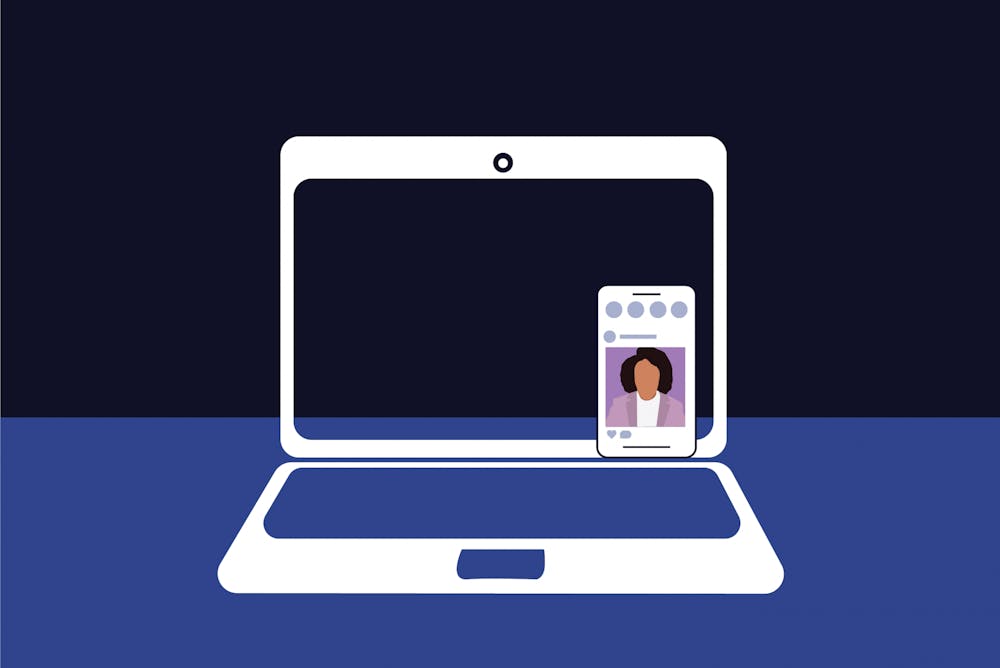
During one of my classes, a professor grumbled that if we were going to stare at our phones for the entire lecture, we may as well like his lab’s Facebook, Instagram, and Twitter accounts while we’re at it. The professor couldn’t see me since my camera was off, but at that moment, I put my phone down, ashamed. He didn’t have to be so snotty about our social media addiction, but he does have a point.
At the beginning of the semester, many professors started off the year by insisting that we leave our videos on and keep our phones in another room, so we wouldn’t be distracted. But it wasn’t that easy. Sometime in September, I checked my phone after a lecture. Six missed calls from mom — that’s never good.
So from then on, I started keeping my phone nearby during lectures. At some point, I thought to myself that sending just one text to my friend can’t hurt. Next thing I knew, I spent so much of class time distracted by my phone that I didn’t even see the point of going to lectures.
In the absence of a standard classroom, I’ve had to set more and more rules for myself. No attending lecture from bed or in pajamas. No eating while on a Zoom call, even if my camera’s off. No waking up at 8:59 a.m. for a lecture at 9:00 a.m.
But eventually, all of those rules got broken for a first time. And then a second time. And again and again, until they had no meaning at all. College is supposed to be a place where students learn to impose rules and restrictions on themselves, as a step toward independence. With more free time and a heavier workload, students must learn to schedule their time in a productive way, which often means restricting time spent hanging out with friends or scrolling through one’s phone. But with online learning, the sheer amount of restrictions that students must place on themselves is a lot to expect from anybody. It’s becoming increasingly clear that Penn has failed us in online learning this semester.
For starters, as I’ve already noted in an earlier article, Penn has not provided us with many opportunities to create long-lasting friendships. Most events that have been hosted by organizations at Penn are one-offs, and while it is easy to meet peers, sustained relationships have been harder to come by. In lecture halls, friendships in classes would organically form through group work and side conversations. In Zoom calls? Good luck trying to have side conversations in a 40 person call or getting to know faceless peers in breakout rooms with their microphones muted.
There is also little to no assistance from Penn in finding study groups for a given class. Though everyone studies differently, I doubt I’m alone in saying that studying with other people helps me focus, and the perspective of my peers can help me crack problems that I would otherwise struggle with.
In addition, cheating at Penn is on the rise thanks to online learning. As if taking Penn’s rigorous coursework wasn’t hard enough, students now compete in an unequal playing field, with those who follow the rules at a disadvantage. Penn could have required professors to redesign their exams or asked students to take an honor pledge. But instead, Penn didn’t even acknowledge this uptick in cheating, which puts so many academically honest students at a disadvantage.
Penn’s administration didn’t just fail its students with online learning. It also failed its faculty. Early on in the semester, the DP put out articles on how both STEM students and faculty at Penn feel overworked. Professors that teach introductory math classes have had to compile new virtual content for their students, creating an hour's worth of Khan Academy-esque videos every week on top of their existing responsibilities.
There are certainly those that have had positive experiences with online learning. There are people that are confident enough to personally engage with their professors in large lectures, and people that are social enough to find best friends, even over Zoom. Furthermore, there are people with the discipline and drive to sit attentively through all of their lectures. But very few Penn students, especially in stressful times like these, possess all of these qualities, or even one.
Even with in-person learning, it is dangerously easy for students to fall behind in college. In normal times, many often put off assignments, papers, or projects until they're left with a mountain of work that no one can possibly finish in one day. But with online learning, there are so many other pitfalls. Your recorded lectures, meant to be watched asynchronously, can pile up. In large lectures, it can be difficult to get the attention of your professors after class, and they may not stay on the Zoom call long enough for you to get a word in. You can submit the wrong PDF by mistake on an exam and not know until it’s too late.
In many ways, Penn’s administration is treating this term as business as usual. It clearly isn't. At the very least, the University must recognize that its online learning system is flawed, given the glaring increases in academic dishonesty and overwork among students, and devise a plan for improvement from there.
CAROLINE MAGDOLEN is a College and Engineering first-year student studying Systems Engineering & Environmental Science. Her email address is magdolen@sas.upenn.edu
The Daily Pennsylvanian is an independent, student-run newspaper. Please consider making a donation to support the coverage that shapes the University. Your generosity ensures a future of strong journalism at Penn.
Donate







